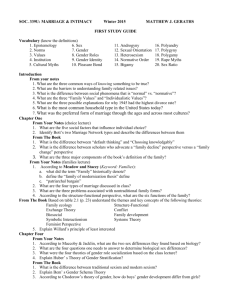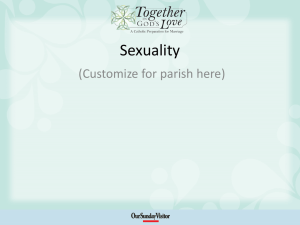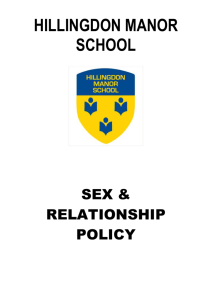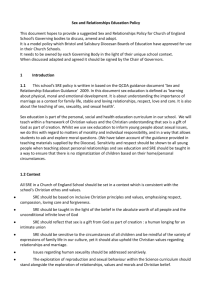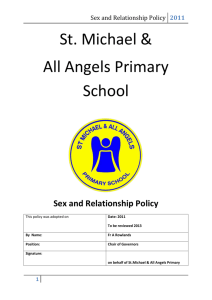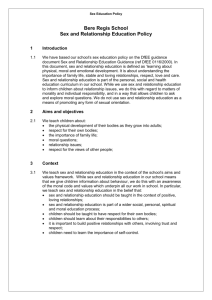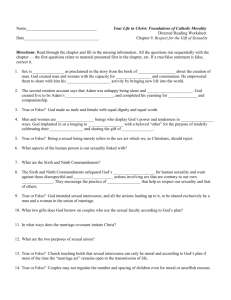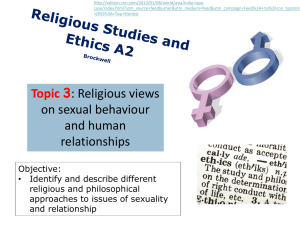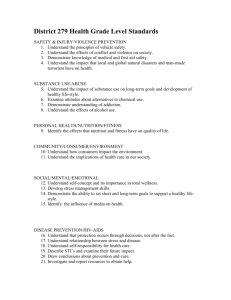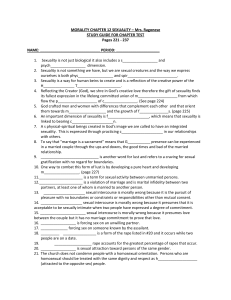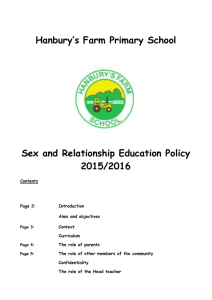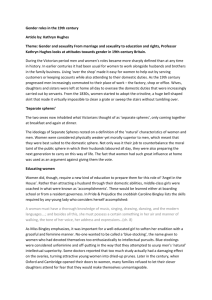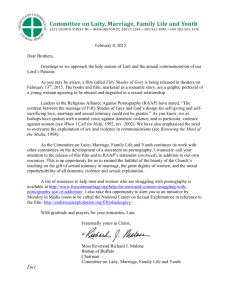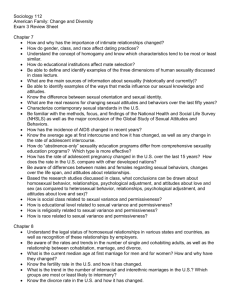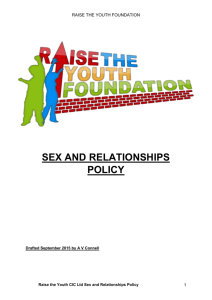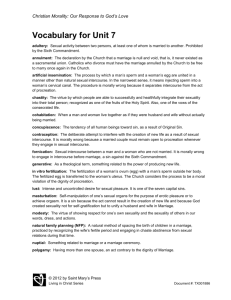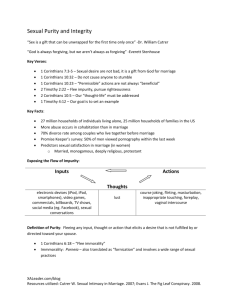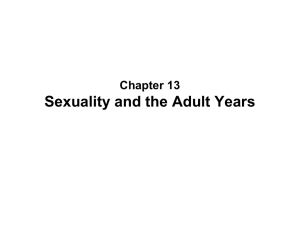Sex and Relationships Policy - April 2015
advertisement
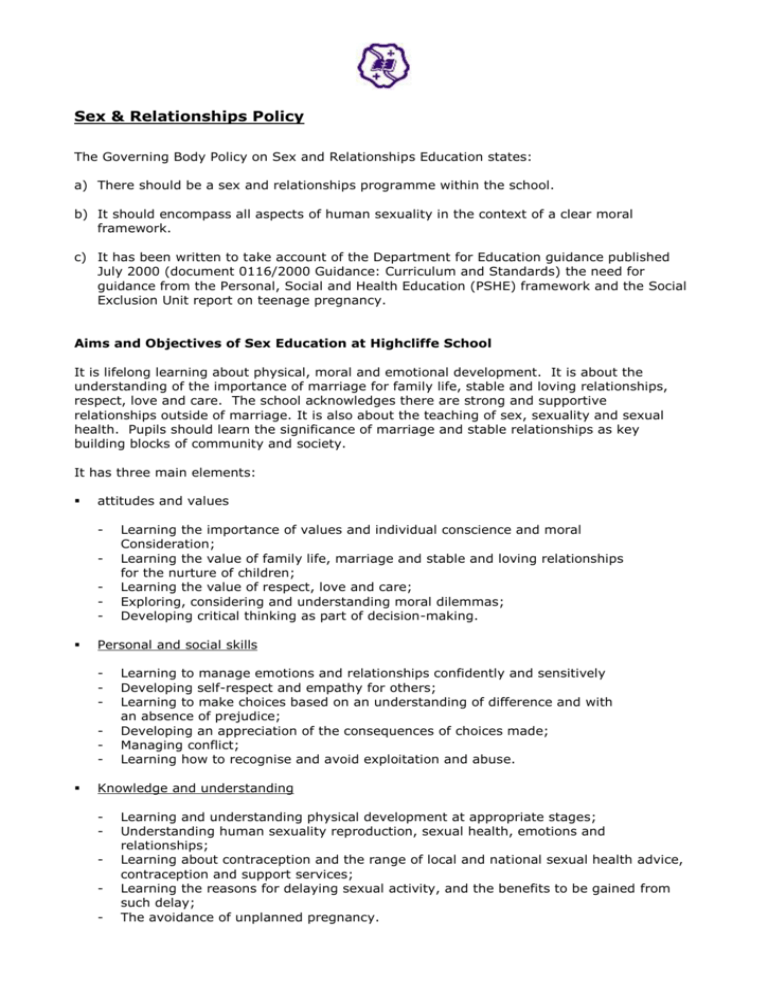
Sex & Relationships Policy The Governing Body Policy on Sex and Relationships Education states: a) There should be a sex and relationships programme within the school. b) It should encompass all aspects of human sexuality in the context of a clear moral framework. c) It has been written to take account of the Department for Education guidance published July 2000 (document 0116/2000 Guidance: Curriculum and Standards) the need for guidance from the Personal, Social and Health Education (PSHE) framework and the Social Exclusion Unit report on teenage pregnancy. Aims and Objectives of Sex Education at Highcliffe School It is lifelong learning about physical, moral and emotional development. It is about the understanding of the importance of marriage for family life, stable and loving relationships, respect, love and care. The school acknowledges there are strong and supportive relationships outside of marriage. It is also about the teaching of sex, sexuality and sexual health. Pupils should learn the significance of marriage and stable relationships as key building blocks of community and society. It has three main elements: attitudes and values - Personal and social skills - Learning the importance of values and individual conscience and moral Consideration; Learning the value of family life, marriage and stable and loving relationships for the nurture of children; Learning the value of respect, love and care; Exploring, considering and understanding moral dilemmas; Developing critical thinking as part of decision-making. Learning to manage emotions and relationships confidently and sensitively Developing self-respect and empathy for others; Learning to make choices based on an understanding of difference and with an absence of prejudice; Developing an appreciation of the consequences of choices made; Managing conflict; Learning how to recognise and avoid exploitation and abuse. Knowledge and understanding - Learning and understanding physical development at appropriate stages; Understanding human sexuality reproduction, sexual health, emotions and relationships; Learning about contraception and the range of local and national sexual health advice, contraception and support services; Learning the reasons for delaying sexual activity, and the benefits to be gained from such delay; The avoidance of unplanned pregnancy. Provision The school will foster a recognition that both sexes should behave responsibly in sexual matters. Pupils will be helped to appreciate the benefits of marriage, a stable family life and the responsibilities of parenthood. All sex education should be delivered within mixed gender groups recognising the rights and opinions of different cultural, religious and ethnic groups. The Governors may take due account of representations or advice they may receive from health authorities and from others, in particular religious groups and ethnic minority communities served by the school. It is the responsibility of all teachers in the school to use their professional skills and expertise to deliver sex and relationship education in an appropriate way. Particular aspects of the work will be covered in the Science National Curriculum (Key Stages 3 and 4), in the PSHE programme and via RE/RS lessons. The school will work closely with health professionals, social workers, youth workers, peer educators and other appropriate visitors who all have a part to play in delivering sex and relationship education. They should all abide by the school’s policy. Working with Parents The school should work effectively in partnership with parents: a. To promote understanding and familiarity with the resources used in sex and relationship education lessons, parents/guardians are welcome to see and discuss the programme of study and the materials used at their own request and before the programme commences. b. Parents have the statutory right to withdraw their children from any Sex and Relationships Education lesson to which they object, other than that required by the National Curriculum. Objections on religious/moral grounds to any part of the programme should be treated by Governors/teachers with sympathetic discretion. Monitoring and Evaluating The delivery of sex and relationship education will be monitored regularly and evaluated annually by consultation with teaching staff, pupils, parents and Governors. The provision of the sex and relationships policy is monitored as part of the Performance Management and school self-evaluation procedures. This policy should be read in conjunction with the school’s Safeguarding Policy and Procedures (including Child Protection). All our practice and activities must be consistent and in line with the Safeguarding Policy and Procedures noted above. Any deviations from these policies and procedures should be brought to the attention of the Headteacher so that the matter can be addressed. Compiled by: C. Stone/M. Jones Agreed by: Headteacher Adopted by: The Governing Body (Reviewed by NCL/MRD – April 2015) Revision number: 3 Revision date: June 2016
